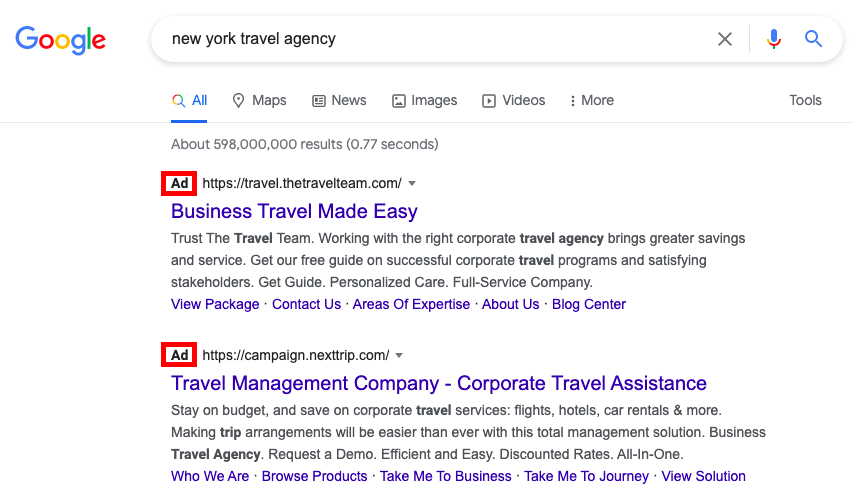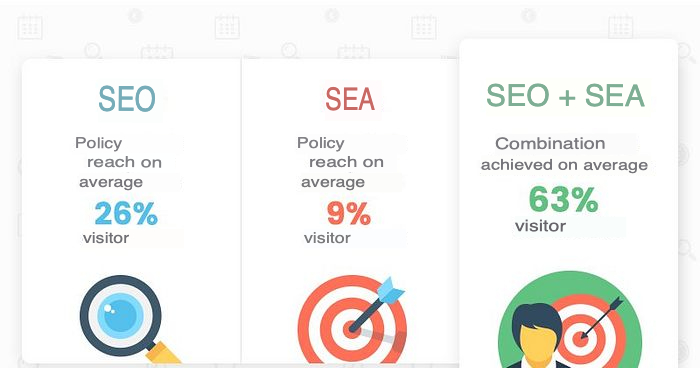
SEO vs. SEA – How to Implement a Successful SEO Strategy?
Last update: 3 March 2023 at 10:03 am
To improve the traffic of your website, you can use 2 SEO techniques: SEO and SEA. To choose the right SEO strategy, it is essential to understand all the options available to you.
Specifically, you can opt for paid search engine optimization (SEA) or for organic search engine optimization (SEO).
In this article, we define organic and paid search engine optimization, we explain the advantages and disadvantages, and we review the SEO vs SEA debate.
By reading this article, you will have a better understanding of these two marketing strategies.
Plus, if you need help boosting your website, we can put you in touch with the best organic and paid search agencies.
Natural Referencing and Paid Referencing: Definition and Functioning
For good use of SEO, it is better to understand the differences between SEO and SEA.
What is Search Engine Optimization (SEO)?
SEO, “Search Engine Optimization”, includes actions intended to increase the visibility of a website. This visibility is obtained by having the best possible positions on search engines.
In other words: to be visible, a website must be on the first page of Google results. And to achieve this, we use SEO.
Why Opt for Natural Referencing (SEO)?
To answer this question, you need to understand how organic search works.
Understanding SEO in 2 Minutes
For each search made on Google, it will rank the best results to offer the most relevant content to Internet users. And in order for your website to appear in the results related to your value proposition, you have to use SEO.
First of all, you will need to do an SEO website audit to identify the strengths and weaknesses of your website. This audit will also allow you to know which websites are your competitors. You can go through an SEO audit agency to do the audit of your site.
Then, you will have to build a strategy based on your audit. Any SEO strategy is based on 3 pillars:
- Content optimization
- Technical optimization
- The generation of backlinks
The optimization of content is to create written content to position yourself on the queries of Internet users. It is thanks to this content that you can appear in the first search results.
Technical optimization consists in making your website understandable for Google. In order for it to rank the search results, it must be able to analyze the websites it is going to propose to Internet users. You have to make his job easier.
You can do this by having an excellent tree structure and by improving the loading speed of your site.
Even with the best content in the world, if your site is not technically optimized, there is little chance that you will be visible online.
Finally, backlink generation is about building your website’s reputation. Think of it this way: the more websites have links to your site, the more visible you will be. This is called netlinking.
The Benefits of SEO
Ultimately, SEO has several advantages:
- Free organic strategy
- Excellent long-term traffic generator
- Strong signal of trust and good reputation for the Internet user
- Overall increase in the quality of a website
In concrete terms, SEO is a long-term strategy. With organic referencing, you build your reputation gradually. As time goes by, Google will trust you more and more and you will appear more often in the search results.
Read our complete guide to SEO to learn more.
What is Search Engine Advertising (SEA)?
Search Engine Advertising (SEA) is the process of creating ads and ranking them in search results.
Paid search advertising displays links in several places: at the top, at the bottom, and to the right of the organic results.
Here is an example:

This means that you can appear at the top of the search results without having to go through SEO. But there are still drawbacks to paid search. More details below.
Why Opt For Paid Search Engine Optimization (SEA)?
To answer this question, we must first understand how this method works.
Understand SEA in 2 Minutes
The SEA is based on a bidding system, in cost per click (CPC) most of the time. In other words, you have to pay to appear on the results page.
The amount to pay will depend on the theme of the website and the level of competition of the targeted keywords.
If the cost of a SEA campaign can be limited to a few hundred euros, the budget can quickly climb.
Moreover, it is not enough to pay to get results. Indeed, the quality of your website and the relevance of your page to the keywords you are targeting is taken into account by Google.
To choose the ads that will appear, Google evaluates :
- The relevance between a keyword and the page where users will land if they click on the ad.
- The bid that the company is willing to make.
A search engine optimization agency will be able to help you in this regard.
The Benefits of SEA
Ultimately, here are the advantages of SEA:
- A strategy with a cost but with a guarantee of results if it is well done;
- A return on investment easily quantifiable and in a short time;
- A visibility going beyond the simple search engines;
- No delay between the launch of the SEA campaign and the actual visibility on search engines.
Thus, compared to SEO, SEA allows you to get results faster and to evaluate those results more accurately.
Read our complete guide to the benefits of online advertising to learn more.
SEO vs Sea : Let’s Summarize the Differences
These two SEO techniques differ on many points. Before choosing one or the other, it is important to understand the differences between SEO and SEA:
The Budget
Search engine optimization is free (not including the time spent optimizing your site and producing content) while paid search can be very expensive.
SEO will require a long-term investment, which will likely decrease over time.
On the other hand, SEA requires constant investment. Without bids, your ads will not appear in the results.
The Content
In SEO, the positioning of a website is directly related to the relevance of its content.
In SEA, it is the landing page and the ” Quality Score ” of the ad that will be important.
The Return on Investment
SEO and SEA have different time frames. The return on investment will be effective in the long term with SEO. In SEA, it is the short term that takes precedence.
Time Spent
This is probably one of the most important differences between SEO and SEA. The time needed for each technique is different. SEO will take a long time to show results. Indeed, it requires optimizing the site, producing content, optimizing it regularly, building backlinks, etc.
SEA will require a minimum amount of time to be effective.
Whether it is in terms of configuration or follow-up of the campaign. Of course, the more competition there is, the more time it will take to set up.
That said, note that writing powerful ads is a delicate exercise that will require some thought.
The Reactivity of Positioning
For SEO, the majority of search engines will take several months before giving you visibility. For SEA, with the almost instantaneous bidding system, the positioning is done in a very short time.
SEO SEA : Which Referencing to Choose?
SEO vs SEA? Which solution to choose? The answer is all the more difficult to provide since for each website and for each objective to be reached there is a specific answer.
The best option will depend on a number of parameters and the resources you have to carry out your project.
Website administrators wishing to limit acquisition costs while focusing on long-term positioning will naturally turn to SEO.

For those who want their website to benefit from better targeting and a more refined positioning than those resulting from natural results, all in an immediate way and with a minimum of human investment, SEA referencing will be the priority.
SEO SEA: Two Complementary Channels
What if the answer to the question “SEO vs SEA: which SEO technique to choose” was: “both“?
Adopting a digital strategy that uses both SEO and SEA methods has only benefits.
Indeed, the implementation of an SEO/SEA strategy will allow :
- To quickly respond to legitimate needs for conversion and traffic thanks to SEA.
- To consolidate its natural positions in a thoughtful way and with long-term results thanks to SEO.
The relevance of having such a strategy is justified when we know the need to appear on the first page of Google to acquire traffic.
To combine viability AND profitability of its website, it is essential to adopt an optimized SEO and SEA strategy.
This strategy must take into account the acquisition costs to be borne, the short and long-term traffic objectives and the competition.
As such, SEO SEA will produce unexpected results.
Discover Our Partner Agencies
You don’t have an SEO SEA department in your company? Rest assured, we can put you in touch with the best SEO agencies.
Contact us and we will help you to carry out your strategy.






